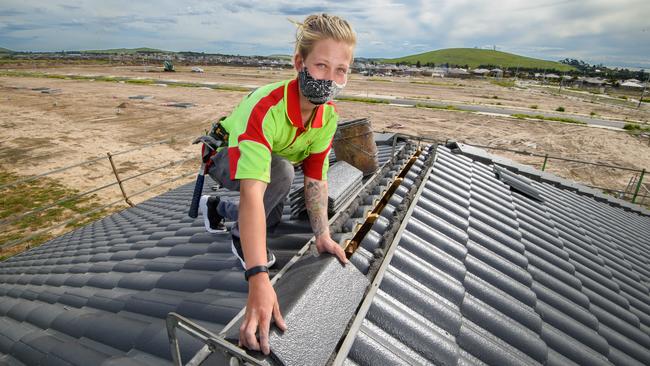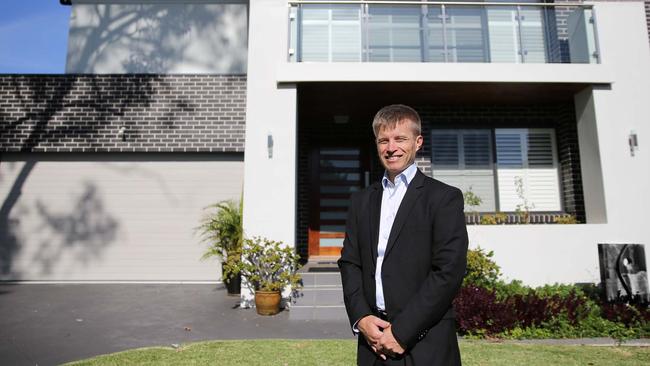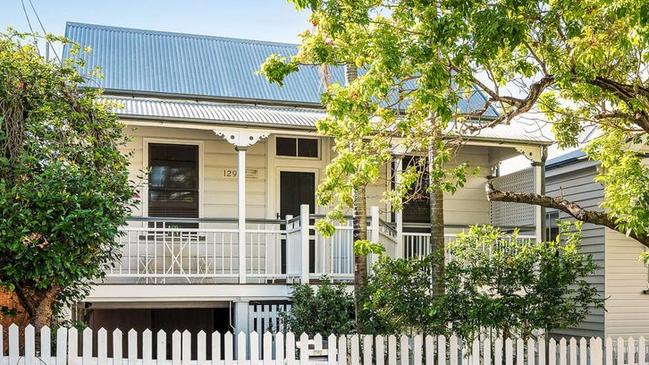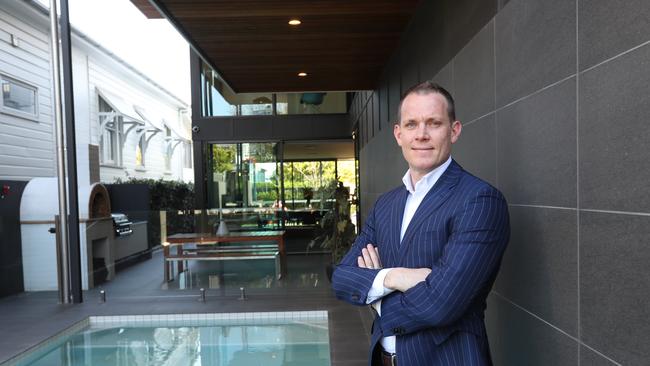Revealed: Best and worst careers to buy a home
New research has thrown stark new light on housing affordability by revealing the time required to save for a home deposit by occupation. SEE HOW YOUR JOB RATES

Property
Don't miss out on the headlines from Property. Followed categories will be added to My News.
Young Queenslanders embarking on a career as a nurse, plumber or teacher face a staggering 30-plus year wait to get a foot on the property ladder. But those starting out in IT, engineering or dentistry could be fast-tracking their way to homeownership.
New research has thrown stark new light on housing affordability by revealing the time required to save for a home deposit by occupation.
The analysis of selected careers by comparison site Finder highlights how wage growth has failed to keep pace with soaring property prices, with 25 years the minimum needed to save for a 20 per cent deposit for even the top-ranked jobs.

Australian Bureau of Statistics (ABS) data shows median household income increased 19 per cent from 2019/20 to 2023/24. Brisbane home prices, meanwhile, surged 46 per cent from 2020-2022, and another 14.4 per cent to May 2024, according to PropTrack’s latest Market Insight Report.
Finder’s data shows it would take 25 years to save a deposit for a typical house in Brisbane priced about $850,000 for young professionals qualified in computing and information systems, engineering, or dentistry. A typical post-uni salary in those industries was between $66,700 and $90,000.

A medical graduate on a starting salary of $75,100 would need to save for 26 years, or 27 years for a roof tiler earning $85,000.
At the other end of the scale, school leavers considering a career in the creative arts could face a lifetime on the rental rollercoaster, with 42 years needed to scrape together a deposit from the starting salary of $52,000.
Sign-writers, painters, and glazers didn’t fare much better, with a wage of $64,324 translating to 40 years of saving.

Finder head of consumer research Graham Cooke said the bottom rung of the housing ladder was higher up than ever before. As prices continued to rise, young Australians’ choice of career path could mean missing out on the great Australian home dream, he said.
“Your career is your income, and that can make the biggest difference to your lifestyle and your home,” Mr Cooke said.
“Any student trying to make the case to a disgruntled parent for a creative arts degree won’t get a lot of ammunition out of this.”

Mr Cooke said the data should also be front of mind for policy makers considering housing support for essential workers.
“This could make it more difficult for hospitals to get nurses and schools to get teachers,” he said.
The Australian Nursing and Midwifery Federation said said the issue was a growing concern for the industry, with a 2023 survey conducted by the body’s NSW chapter finding more than 76 per cent of respondents lacked “affordable and secure housing”.
“The problem is becoming worse in metropolitan cities, where our members can’t afford to live close to where they work,” ANMF federal secretary Annie Butler said.
“This situation is unsustainable and is impacting the recruitment and retention of nurses and midwives.”
The outlook was brighter for unit buyers, with an apartment within reach in 15 years for a roof tiler, or up to 25 years for arts graduates.
A typical Brisbane unit costs about $600,000.

The Finder calculations considered time spent studying or in an apprenticeship, entry-level incomes, future remuneration based on historic data from government surveys for Quality Indicators for Learning and Teaching, and inflation-linked growth for wages.
Income was deducted to cover cost of living and rent with inflation, with feasible savings extrapolated from the remaining amount.
Mr Cooke said the data threw up some surprises, such as that roof tilers were on a comparable path to homeownership with frontrunners such as dentists.
This was because roof tilers reached competitive wages faster than those who took on careers with more in-depth education.
“And a lot of money will go into building more homes across Australia,” he said.

Australian Roof Tilers Association chief executive Cathy Inglis said people tackling the trade could be “very competent” and earning the industry’s $85,000 standard wage in as little as two years.
Ms Inglis said the skill was in high demand, with governments around the country looking for ways to incentivise more people to work in the space.
“And with the amount of roofs that have had to be done after storms, particularly in Queensland, many have gone from project homes into insurance markets where they can get much better pay,” she said.
While there was limited scope to grow wages in the field by upskilling later on, Ms Inglis said it made sense to earn good money earlier on in your career if owning a house was a goal.

Buyer’s agent Lloyd Edge, of Aus Property Professionals, said first homebuyers needed to consider their future capacity to service a home loan, alongside saving the required deposit.
“The occupation you work in can have a huge impact on the amount of time it takes for you to save up for a deposit, as well as how much the banks will actually lend you,” Mr Edge said.
“Of course if you are earning more you should be able to save more. But, some professions actually need to save up less of a deposit to get their foot onto the property ladder.”
While an initial deposit of 20 per cent was generally required to avoid paying lender’s mortage insurance (LMI), certain occupations could access a home loan with as little as 5 or 10 per cent deposit.
“This means that not only do you need to save less of a deposit, but you can get into your home years earlier, and potentially save hundreds of thousands of dollars if you are able to buy before the market increases,” Mr Edge said.

Professionals able to access the LMI waiver included those in high paying, secure jobs, and therefore “extremely unlikely to default on a loan repayment”, such as doctors, dentists, accountants, lawyers and engineers.
Mr Edge said occupation also impacted how successful prospective buyers were in saving.
“Being mindful of how you spend in your day-to-day working life can help you save better for your deposit.”
A travelling medical professional, for example, could receive perks like free accommodation and meals, as well as bonuses for being on call. On the other hand, a city office worker could be spending more of their income on rent, travel, parking and expensive lunches — “meaning you are spending a lot more of your take home pay which will also take a huge chunk from your property deposit”.

MORE NEWS
Hottest auction home is ‘not for the faint-hearted’
Mapped: Qld’s worst suburbs for mortgage default
Prices triple in new $4m suburb you’ve probably never heard of
Ray White The Collective principal Matt Lancashire said the Miles government’s recent announcement of an increased stamp duty concession threshold had already brought more first homebuyers into the market.
The threshold would be lifted to $700,000, saving eligible buyers up to $17,000 on their home purchase.
“The first homebuyer territory is on fire,” Mr Lancashire said, speaking after an auction event where units were in hot demand.
“The real estate market in Brisbane is being underpinned by a stock crisis and the interstate migration rates are at an all-time high.
“We are at the start of our golden decade. You want to buy in 2024 not 2032.”

Q Shelter CEO Fiona Caniglia said policy shift was needed to increase declining rates of homeownership among young people in particular.
While 63 per cent of people born in the 1950s owned a home by age 30, that rate had fallen to about 45 per cent for those born in the 1980s.
“This can lead to the situation where people, as they age, do not achieve the same rate of home ownership as was the case for previous generations of Australians,” Ms Caniglia said.
“We do welcome to increase in the [stamp duty] threshold.
“We must also be working across the housing system to increase supply to avoid the negative impacts of inflation.
“This requires serious attention to every factor impacting construction costs and impediments so there is supply to meet rising demand,” she said.
Mortgage guarantees and shared equity arrangements were among schemes with potential to address the deposit constraints and onus of loan repayments for young buyers at the start of their careers.


